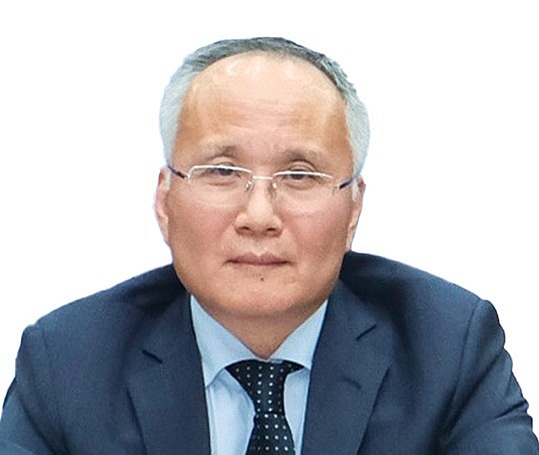ASEAN members in overdrive to achieve prosperity
Could you share with us the priorities for ASEAN in its economic cooperation?
 |
| Deputy Minister of Industry and Trade Tran Quoc Khanh |
Brunei proposed “We care, we prepare, we prosper” as the theme for its ASEAN chair role this year, together with 13 economic priority deliverables which focus on recovery, digitalisation, and sustainability.
In addition to the initiatives proposed by Brunei, Vietnam and the other ASEAN countries discussed the continued implementation of initiatives on economic cooperation such as the ASEAN Master Recovery Plan, the expansion of the ASEAN List of Essential Goods to Respond to the Pandemic, an MoU on the implementation of non-tariff measures on these goods, and supply chain connectivity.
The bloc agreed to maintain current commitments on market opening for trade and investment and to strengthen trade facilitation to ensure the smooth flow of goods. Moreover, the partners want to strengthen production networks, build sustainable regional supply chains, promote technology applications, and turn ASEAN into a strong economic community and an attractive investment destination.
What key solutions were offered at the AEM for the immediate and long-term, and which documents have been approved?
For the short-term, some urgent problems for Vietnam and ASEAN need to be resolved to overcome the consequences of the pandemic and enable economic recovery.
At this meeting, the economic ministers emphasised the importance of ensuring the simultaneous implementation of anti-pandemic measures while promoting economic recovery and setting orientations for effective initiatives that were adopted in 2020, such as the ASEAN Master Recovery Plan, the ASEAN+3 Action Plan, and the ASEAN-Japan Economic Resilience Action Plan, among others.
The ministers also agreed on the need to maintain existing commitments on market openness in trade and investment, refrain from applying unnecessary restrictive measures to trade, and make efforts to deal with non-tariff barriers. Meanwhile, they agreed that it is crucial to strengthen trade facilitation measures to promote intra-regional trade, stabilise production, maintain supply chain connectivity, and contribute to economic recovery after the pandemic.
Further, the ministers noted that work on upgrading ASEAN’s various free trade agreements (FTAs) should be progressing. The meeting also tasked officials to expedite efforts to incorporate elements that would help ensure the resilience of the regional supply chains, promote digitalisation, and deliver new and meaningful commercial opportunities to businesses.
The development of a common approach for ASEAN+1 FTAs also contributes to further strengthening the economic cooperation between ASEAN and its external partners such as Australia, New Zealand, South Korea, and China.
For the long-term, ASEAN has completed the review of the Master Plan to build the ASEAN Economic Community (AEC) by 2025. Based on this assessment, the ministers agreed to develop solutions to implement the master plan by 2025 for the new context in the region, as well as helping ASEAN to overcome challenges on a global scale. There will be comprehensive solutions to improve the building of the AEC, focusing on recommendations such as pursuing a more proactive and strategic approach to foreign relations.
The ministers ratified 107 tariff lines on produce and food products into the ASEAN’s list of necessities that are subject to non-tariff measures in a bid to help its members better respond to the pandemic. Moreover, the ministers adopted the roadmap on digital transformation in ASEAN to promote economic recovery and digital economic integration, as well as adopted joint statements between ASEAN and its partner countries China and the United Kingdom to strengthen and further promote economic cooperation.
The Regional Comprehensive Economic Partnership (RCEP) was also discussed at the AEM. What is the progress from this discussion?
The RCEP is one of the achievements contributing to the overall success of Vietnam in 2020 as the chair of ASEAN.
At that time, as the RCEP Ministerial Conference and Vietnam worked with the bloc’s countries to come up with initiatives to handle the outstanding issues, so that the negotiations could be concluded, and the agreement signed on the sidelines of the 37th ASEAN Summit taking place in November.
Following that success, the partners all expect the RCEP to come into effect soon, possibly in early 2022, to promote trade and investment in the region, contributing to the post-pandemic economic recovery.
The RCEP will enter into force 60 days after the date on which at least six ASEAN signatories and three non-ASEAN signatories have completed their domestic procedures.
Singapore was the first country that ratified the RCEP in April, followed by China and Japan. The remaining ASEAN countries are expected to complete the ratification before November. Indonesia, Malaysia, and the Philippines are expected to complete the ratification procedures by the end of this year.
Vietnam is completing the final steps for the ratification and is expected to complete the approval of the RCEP before November as well.
What the stars mean:
★ Poor ★ ★ Promising ★★★ Good ★★★★ Very good ★★★★★ Exceptional
 Tag:
Tag:
Related Contents
Latest News
More News
- Russian President congratulates Vietnamese Party leader during phone talks (January 25, 2026 | 09:58)
- Worldwide congratulations underscore confidence in Vietnam’s 14th Party Congress (January 23, 2026 | 09:02)
- Political parties, organisations, int’l friends send congratulations to 14th National Party Congress (January 22, 2026 | 09:33)
- 14th National Party Congress: Japanese media highlight Vietnam’s growth targets (January 21, 2026 | 09:46)
- 14th National Party Congress: Driving force for Vietnam to continue renewal, innovation, breakthroughs (January 21, 2026 | 09:42)
- Vietnam remains spiritual support for progressive forces: Colombian party leader (January 21, 2026 | 08:00)
- Int'l media provides large coverage of 14th National Party Congress's first working day (January 20, 2026 | 09:09)
- Vietnamese firms win top honours at ASEAN Digital Awards (January 16, 2026 | 16:45)
- ASEAN Digital Ministers' Meeting opens in Hanoi (January 15, 2026 | 15:33)
- ASEAN economies move up the global chip value chain (December 09, 2025 | 13:32)






















 Mobile Version
Mobile Version